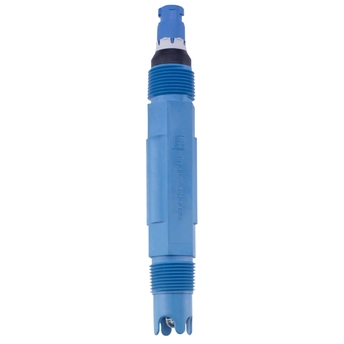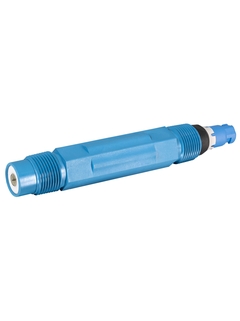-
Measuring principle
Potentiometric
-
Application
Flotation, leaching, neutralization, outlet monitoring
-
Characteristic
Resistent against electrolyte poisoning and dirt repellent gel-electrode including process connection NPT 3/4″
-
Measurement range
pH 0 to 14
-
Measuring principle
Gel-compact electrode with double chamber reference system, kalium nitrate bridge electrolyte and PTFE-diaphragm
-
Design
Compact electrode in PPS housing with NPT 3/4″ process connection
-
Material
Housing: PPS
pH electrode: lead-free membrane glass
Double chamber reference system: KNO3 and KCl/AgCl -
Dimension
Diameter: 22 mm (0.87 inch)
Length (protcetion guard, long shaft): 150 mm (5.91 inch)
Length (flat membrane): 140 mm (5.51 inch) -
Process temperature
Version LH: 0 to 110 °C (32 to 230 °F)
Version NN: 0 to 80 °C (32 to 170 °F) -
Process pressure
1 to 10 bar abs at 80 °C
(15 to 145 psi at 176 °F) -
Temperature sensor
NTC 30K
-
Ex certification
(optional) FM IS NI Cl. I Div.1&2, Groups A-D
-
Connection
Memosens plug
-
Ingress protection
IP68
Field of application
Memosens CPF81E is the digital, robust solution for harsh environments. It measures reliably and accurately even in abrasive media and at high flow rates. With its integrated assembly, the electrode saves installation space. Thanks to Memosens 2.0 digital technology, CPF81E combines maximum process integrity with simple operation. It resists moisture and enables lab calibration. It offers extended storage of calibration and process data providing the perfect basis for predictive maintenance.
Memosens CPF81E is the robust pH sensor for processes in mining industries and treatment of industrial water and wastewater. It monitors:FlotationLeachingNeutralizationInlet and outlet With CSA C/US approval for use in hazardous areas, zones 0, 1 and 2.
Benefits
Memosens 2.0 offers extended storage of calibration and process data, enabling better trend identification and providing a future-proof basis for predictive maintenance and enhanced IIoT services. Long time stable: Double junction provides better protection against electrode poisoning ions such as S2- or CN-. Robust polymer housing protects against mechanical damage. Optional flat membrane makes the sensor suitable for high flow rates and abrasive media. Non-contact, inductive signal transmission ensures maximum process safety. Maximum process uptime and extended sensor lifetime reduce operating costs.


